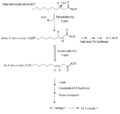Fatty acid synthesis
Fatty acid synthesis is the biological process by which fatty acids are produced from acetyl-CoA, malonyl-CoA, and NADPH. This process takes place in the cytoplasm of cells and is vital for the production of lipids (fats), which are essential components of all cells.
Process[edit]
Fatty acid synthesis begins with the carboxylation of acetyl-CoA to malonyl-CoA, a reaction catalyzed by the enzyme acetyl-CoA carboxylase. This is the committed step of fatty acid synthesis because it is the point at which the cell commits to using the acetyl-CoA molecule for lipid synthesis.
The malonyl-CoA is then transferred to a protein called fatty acid synthase, which carries out the remaining steps of the process. These steps include a series of reductions and condensations that result in the addition of two carbon atoms to the growing fatty acid chain for each cycle of the process.
The final product of fatty acid synthesis is usually a 16-carbon fatty acid called palmitic acid. However, the process can be modified to produce other types of fatty acids, such as stearic acid and oleic acid, by the action of additional enzymes.
Regulation[edit]
Fatty acid synthesis is tightly regulated by a variety of mechanisms to ensure that it occurs only when necessary. For example, the enzyme acetyl-CoA carboxylase is regulated by both allosteric control and covalent modification. In addition, the availability of substrates and the energy status of the cell also influence the rate of fatty acid synthesis.
Clinical significance[edit]
Abnormalities in fatty acid synthesis can lead to a variety of health problems. For example, deficiencies in the enzymes involved in the process can lead to fatty acid synthesis disorders, which can cause a variety of symptoms ranging from mild to severe. In addition, overactive fatty acid synthesis is associated with obesity and type 2 diabetes, as it can lead to an excess of stored fat in the body.
See also[edit]

This article is a biochemistry stub. You can help WikiMD by expanding it!
- Fatty_acid_synthesis
-
Fatty_acid_synthesis
-
Fatty_acid_synthesis
-
Fatty_acid_synthesis
-
Fatty_acid_synthesis
-
Fatty_acid_synthesis
-
Fatty_acid_synthesis
-
Fatty_acid_synthesis
-
Fatty_acid_synthesis
-
Fatty_acid_synthesis
-
Fatty_acid_synthesis
-
Fatty_acid_synthesis
Ad. Transform your life with W8MD's Budget GLP-1 injections from $75


W8MD offers a medical weight loss program to lose weight in Philadelphia. Our physician-supervised medical weight loss provides:
- Weight loss injections in NYC (generic and brand names):
- Zepbound / Mounjaro, Wegovy / Ozempic, Saxenda
- Most insurances accepted or discounted self-pay rates. We will obtain insurance prior authorizations if needed.
- Generic GLP1 weight loss injections from $75 for the starting dose.
- Also offer prescription weight loss medications including Phentermine, Qsymia, Diethylpropion, Contrave etc.
NYC weight loss doctor appointmentsNYC weight loss doctor appointments
Start your NYC weight loss journey today at our NYC medical weight loss and Philadelphia medical weight loss clinics.
- Call 718-946-5500 to lose weight in NYC or for medical weight loss in Philadelphia 215-676-2334.
- Tags:NYC medical weight loss, Philadelphia lose weight Zepbound NYC, Budget GLP1 weight loss injections, Wegovy Philadelphia, Wegovy NYC, Philadelphia medical weight loss, Brookly weight loss and Wegovy NYC
|
WikiMD's Wellness Encyclopedia |
| Let Food Be Thy Medicine Medicine Thy Food - Hippocrates |
Medical Disclaimer: WikiMD is not a substitute for professional medical advice. The information on WikiMD is provided as an information resource only, may be incorrect, outdated or misleading, and is not to be used or relied on for any diagnostic or treatment purposes. Please consult your health care provider before making any healthcare decisions or for guidance about a specific medical condition. WikiMD expressly disclaims responsibility, and shall have no liability, for any damages, loss, injury, or liability whatsoever suffered as a result of your reliance on the information contained in this site. By visiting this site you agree to the foregoing terms and conditions, which may from time to time be changed or supplemented by WikiMD. If you do not agree to the foregoing terms and conditions, you should not enter or use this site. See full disclaimer.
Credits:Most images are courtesy of Wikimedia commons, and templates, categories Wikipedia, licensed under CC BY SA or similar.
Translate this page: - East Asian
中文,
日本,
한국어,
South Asian
हिन्दी,
தமிழ்,
తెలుగు,
Urdu,
ಕನ್ನಡ,
Southeast Asian
Indonesian,
Vietnamese,
Thai,
မြန်မာဘာသာ,
বাংলা
European
español,
Deutsch,
français,
Greek,
português do Brasil,
polski,
română,
русский,
Nederlands,
norsk,
svenska,
suomi,
Italian
Middle Eastern & African
عربى,
Turkish,
Persian,
Hebrew,
Afrikaans,
isiZulu,
Kiswahili,
Other
Bulgarian,
Hungarian,
Czech,
Swedish,
മലയാളം,
मराठी,
ਪੰਜਾਬੀ,
ગુજરાતી,
Portuguese,
Ukrainian


